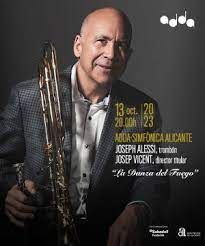The word memorable is much overused. It now tends to signify something that is rather bland, an experience unworthy of being labelled “world class”, “incredible”, “iconic” or some other meaningless malapropism. And if something is truly memorable, how long would we expect that memory to last? A minute? An hour? A lifetime?
Last night’s concert in ADDA, Alicante, was memorable. Its music alongside its experience will live in my own memory for the rest of my life. And it won’t be at the level of a distancing or fading recollection. This musical experience will forever be vivid, enhanced by Chick Corea’s wholly original score, and Joe Alessi’s skilled and committed playing.
Trombone concertos have been pretty thin on the ground until recent years. That is strange, because the instrument, also known as the sackbut, has been an orchestral feature for many centuries. In the past, of course, before the technological enhancements of the last two centuries, the instrument might have been used purely primarily for volume and had a reputation for clumsiness. A change of key might even need a different instrument. No more.
Chick Corea was a famous performer. His most familiar style was jazz, performing as a soloist or alongside the great names of the musical language. Chick Corea the bandleader and improviser we know from recordings, but Chick Corea the composer is less well-known. The trombone concerto that Joe Alessi commissioned from him turned out to be his last composition. Chick Corea apparently wanted to end the work quietly, but Joe Alessi plucked up the courage to ask him to change approach and up the excitement at the end. One would never have known there had been any change, so wonderfully did the work communicate its intentions.
What was so striking about the music was its apparently complete originality. Every phrase seemed to exist in a sound world new to the audience, to explore sonorities that even a concert goer with almost a lifetime of memories found not only surprising but striking. And these textures, generally, were delivered at a whisper, never a shout. Yes, there were jazz idioms, but there was also Charles Ives here (perhaps also walking around New York) and Copeland, amongst others. Presented as a stroll, followed by a couple of dances, punctuated by a little anguish, the music promised a relaxed meandering around tonal centres. But Chick Corea’s rhythms, let alone his harmonies, are rarely predictable. Rhythms break, and there are hooks sticking out that catch you as you pass. The listener is constantly lulled into assured familiarity only to be presented with sonorities and trips that keep the concentration fixed on where the next step might fall. The dances and the strolls therefore force you to notice everything, because it may trip you up.
Memorable it was. It’s a work and a performance that will live in the mind as long as I do, not least because of Joe Alessi’s wonderful performance. It was not just virtuoso. It was committed in a way that communicated his obvious and complete love of the piece. And the ADDA audience in its entirety shared the emotion and commitment of all of the performers, who, collectively, and Joel, Alessi in particular, made their work and our evening so utterly memorable.
Joe Alessi played what he described as a love song as an encore, perfect he said, for a daybreak stroll along Alicante’s waterfront. And then, buy popular request, we heard the coda from Chick Corea’s concerto a second time, its high note ending asking the soloist to work hard again. I am sure it was a labour of love.
The rest of the concert will live alongside the memories. Mussorgky’s Night on a Bare Mountain opened the evening. The unconventional music of Mussorgsky was revelatory, if not, always competent or coherent. The piece, however, is a complete success in its orchestral version. Not all visionaries of capable of perfection, as Repin’s portrait of the composer graphically illustrates. There is a lot going on.
And in the second half, we were presented with what promised to be the main event in the form of a performance of Stravinsky’s Firebird ballet, alongside a film by Lukas van Woerkum, which offered a suitably silent, balletic re-interpretation of the fairytale. The effect was spectacular, but personally, I found that the visual sometimes caught me not listening to the music. As ever, the ADDA orchestra under Josep Vicent played faultlessly and the interpretation was nothing less than both faithful and spectacular. The film did make me listen to the piece in a different way. It was memorable effect, however, on a memorable evening.

No comments:
Post a Comment
Please do keep comments relevant to the post